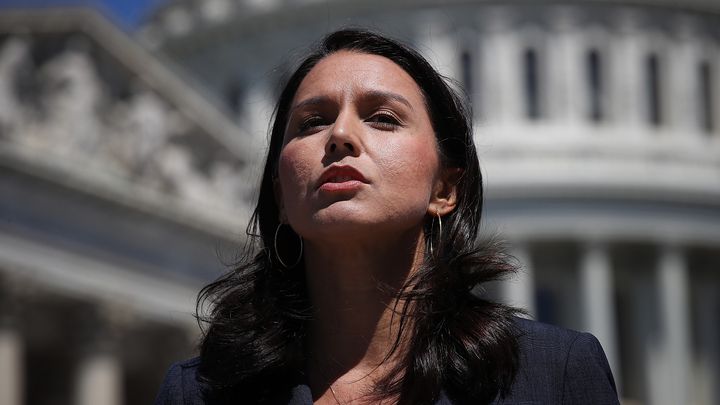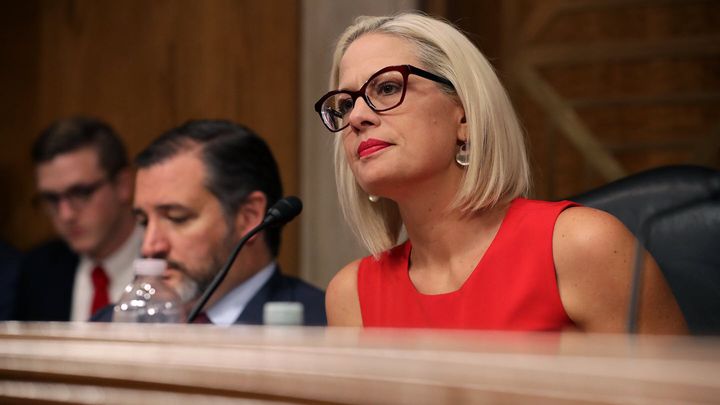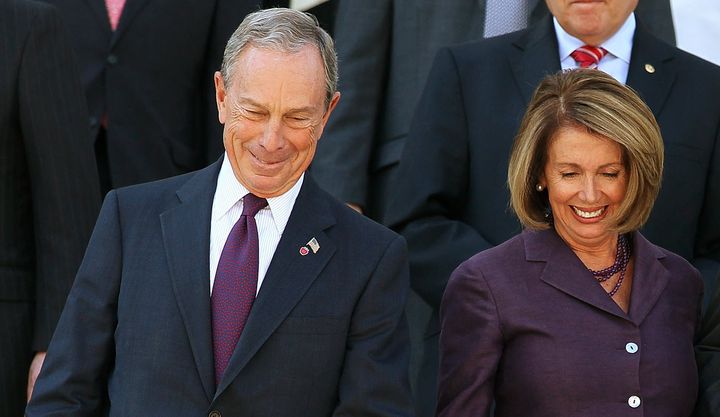This post is authored by investigative reporter Eoin Higgins.
Tulsi Gabbard, the Iraq War veteran who represents Hawaii’s 2nd District in the House of Representatives, is widely believed to be close to announcing a run for president. Gabbard hopes to capitalize on her ties to popular Vermont Senator Bernie Sanders, who may himself be considering a run for the White House; she’s already made moves to secure talent in advance of a run.
Despite her popularity with some liberal Democrats, however, Gabbard’s connections to right-wing groups both at home and abroad have raised eyebrows. Whether it’s the affection shown her by Steve Bannon, who set up Gabbard’s meeting with Donald Trump before the president’s inauguration, or the congresswoman’s associations with autocrats like President Bashar al-Assad of Syria and Prime Minister Benjamin Netanyahu of Israel, Gabbard’s views on foreign policy remain problematic for some on the left.
Gabbard and her office did not answer a request for comment.
Gabbard, who is Hindu, has connections to India, the world’s most populous Hindu nation, including to the country’s Hindu nationalist movement, which is considered fascistic by observers like Rajeev Ravisankar, a PhD student in media studies at the University of Oregon and observer of Indian politics.
“The Hindu nationalist, or Hindutva, movement is one of the largest global right-wing movements in the world,” Ravisankar told Sludge in an email. “It directly drew inspiration from European fascism and has developed a vast network in post-independence India.”
According to Ravisankar and other critics, like progressive Hindu organization Sadhana, Hindu nationalists in the U.S. have a political voice in the Hindu American Foundation, an organization founded in 2003 by Dr. Mihir Meghani, Aseem and Suhag Shukla, and three other individuals. The organization has received criticism over the past 15 years for its ties to right-wing Indian politicians and what some see as genocide denial. Observers on Capitol Hill say the Foundation has recently become more vocal in their support for India’s Hindu nationalist Prime Minister, Narendra Modi.
“HAF’s alacrity in protecting Hindutva organizations from any kind of international censure for violence against minorities in India stands in stark contrast to its vigorous efforts to highlight the plight of Hindu minorities in countries around the world,” the Coalition Against Genocide’s Dr. Shaik Ubaid and Dr. Raja Swamy said in a statement dated April 7, 2014. “Far from being an organization committed to promoting human dignity and pluralism, HAF stands exposed as a foe of human rights, working to defend the Hindutva movement from much needed public scrutiny in the US.”
The Foundation, for its part, considers the Coalition a Hinduphobic organization and, in a Dec. 15, 2013, statement, Samir Kalra, now the organization’s senior director, referred to the Coalition as “radical extremists.”
Gabbard has been the beneficiary of the largesse of the Foundation’s board members and officers. In the 2017-2018 cycle, the Congresswoman received a maximum $2,700 donation from Shukla, and three donations totaling $1500 from her husband and foundation Board Member, Aseem; a total of $10,800 over four donations from Board Member Ravij Pandit and his wife, Priya; and two donations totaling $4,400 from Treasurer Rishi Bhutada. Meghani, HAF’s Chairman, was Gabbard’s biggest donor, maxing out to the campaign in two donations for $5,400 and delivering another $10,000 to the Congresswoman through her Time to Unite Lead and Serve with Integrity (TULSI) leadership PAC.
“The political contribution history of our Board members and officers is publicly available, and you’ll find they’ve contributed to a variety of candidates over the years at similar levels,” said Senior Director Shukla in an email to Sludge. “Indeed as the first Hindu American elected to Congress, Rep. Gabbard naturally enjoys the support of many Hindu Americans.”
Ravisankar described the Foundation as “a pernicious organization that has positioned itself as a mainstream advocacy outfit simply representing Hindus in the US.”
“HAF is better situated as part of the broader right-wing Hindu political sphere,” Ravisankar added.
Indian Prime Minister Narendra Modi’s governorship of the Gujarat province from 2001 to 2014 included being in charge during anti-Muslim riots in 2002 that claimed between 1,044 and 2,000 lives. Modi has been accused of, at best, refusing to intervene and, at worst, of encouraging the violence.
The Foundation’s support for Gabbard—over $24,000 in 2017-2018—is a not insubstantial amount, even in context of Gabbard’s total $1,394,524 haul for the cycle. And that support has been reciprocated by the Congresswoman; an internship program funnels students from the organization’s offices in Washington to Gabbard’s offices in the Capitol, Gabbard regularly attends events sponsored by the Foundation, and both Gabbard and the organization joined forces to welcome Modi to the US in September 2014. That December, at Modi’s invitation, Gabbard traveled to India and met with right wing leaders in the country.
In her statement to Sludge, Shukla cited ties between the Indian Prime Minister and American politicians of both parties.
“Lawmakers from both sides of the aisle and members of both the Trump and Obama Administrations have visited India to demonstrate their commitment to expanding the US-India strategic partnership,” said Shukla. “President Obama met with Prime Minister Modi eight times during his second term, described his relationship with PM Modi as one of his highest foreign policy priorities, and even called to say goodbye during the last days of his presidency.”
Those denials notwithstanding, the organization has maintained ties with right-wing elements in India, especially as the Asian subcontinent nation’s politics have gone further to the right.
But, Shukla said, it’s likely that criticism of Gabbard on her connection to Modi and the Indian right wing may be based in something uglier.
“Rep. Gabbard similarly met with India’s leaders,” said Shukla, “so judging Rep. Gabbard or any Hindu American by a measure different from that of others, or to impugn a different, or ‘special’ relationship with a foreign government simply on the basis of a shared religion is Hinduphobic and xenophobic.”
UPDATE (Dec. 27): Shukla said in an email to Sludge that the Hindu American Foundation denies any associations with groups based in India.
CORRECTION: An earlier version of this article incorrectly said that Ramesh Bhutada was a member of the Hindu America Foundation’s Board of Directors. It also said that a press release from Kalra was from 2003 when it was in fact from 2013.
This post is authored by investigative reporter Eoin Higgins.


